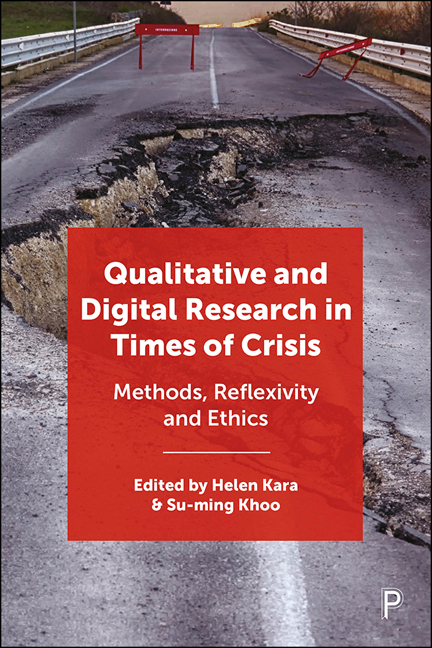2 - Ethnography in crisis: methodology in the cracks
Published online by Cambridge University Press: 13 May 2022
Summary
While the all-encompassing nature of large-scale crises dominates the news, small-scale, localised, and less newsworthy forms of crisis occur continually, altering people's lives and creating unexpected change. The OED defines crisis as a ‘decisive stage in the progress of anything’ (OED, 2021). I see crisis here as a point of change, or a series of events, that disrupt the social world, introducing a period of uncertainty.
This chapter is based on the ethnographic part of my doctoral research in 2018– 21 exploring the potential of a collaborative co-housing project to disrupt the social and spatial boundaries of inclusion/exclusion of intellectually disabled people. Designers, artists, and architects collaborated with members of a supported housing provider to co-create interdependent and supportive neighbourhoods together with people with additional needs. Invested in ideas of ‘housing the social’ (Nimble Spaces, nd) and civic engagement, the project developed as a pilot project to explore housing for residents with diverse abilities in Callan, Ireland. National housing shortages were exacerbated by the 2008 financial crisis and policy austerity impacted social housing. There was therefore a need to build alternative options for people with support needs beyond large, congregated residential facilities (HSE, 2011; ILMI, 2019).
However, during my fieldwork, a series of unexpected crises stalled the project and impacted on my research. The emerging stories changed from focusing solely on building new homes towards the experience of negotiating and adapting to the changes and transitions occurring. The situated and deductive research practices of ethnography facilitate shifting directions in research as a response to changes in the field (ASA, 2020). As a result, my research aims and objectives turned from focusing on the project alone towards a consideration of the ideas and values that informed it. Opening up the research questions in a changing environment allowed me to consider what was, is, and might be. In this chapter, I am interested in the potential of ethnography as a reflexive and flexible research method and to explore its potential to facilitate my negotiated response.
Co-production and collaboration
Nimble Spaces began as a collaboration between Camphill Callan, Workhouse Union (formerly known as Commonage), and their neighbours.
- Type
- Chapter
- Information
- Qualitative and Digital Research in Times of CrisisMethods, Reflexivity and Ethics, pp. 30 - 42Publisher: Bristol University PressPrint publication year: 2021



